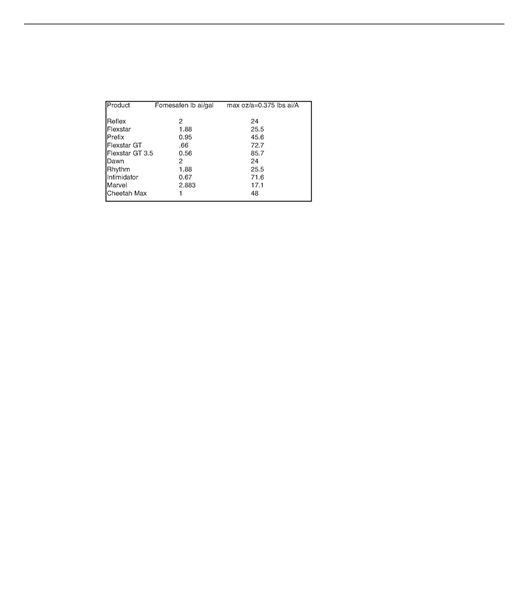Fomesafen Carryover Into Grain Sorghum Update
DR. LARRY STECKEL
JACKSON, TENN.
There continues to be quite a few folks wanting to know how fomesafen applied last year could affect grain sorghum planted this spring. The concern is understandable as grain sorghum is very prone to injury from fomesafen carryover.
The answer to this question is not completely straight forward for a number of reasons. First there are numerous herbicides that contain fomesafen and they can range from a 0.56 lb ai/gallon material to a 2.883 lb ai/gallon material. Therefore, one has to think in active fomesafen/A and not just ounces of a given trade name. Please keep in mind that the maximum season use rate of fomesafen is 0.375 lbs ai/A. Below is a list of a number of herbicides that contain fomesafen and their corresponding maximum ounce rate that provides 0.375 lb ai/A of fomesafen.
Another reason that it is not a straightforward answer is that the likelihood that fomesafen is going to be a problem in a given grain sorghum field this year will vary due to a number of factors. The timing of application(s) last spring/summer, the total amount of active ingredient of fomesafen applied last summer, soil type and weather all have a great impact on carryover issue this spring.
Here are a couple of items to consider when assessing this issue.
1. Maximum fomesafen season use rate is 0.375 lbs ai/A
2. There is a 10 month recropping to grain sorghum requirement. This would dictate that a fomesafen applied July 1, 2014, could harm grain sorghum if it is planted before May 1st 2015. Grain sorghum could not be planted before June 1, 2015 if fomesafen was applied on August 1st 2014.
3. DO NOT plant grain sorghum in 2015 if the maximum amount of fomesafen (0.375 lb ai/A) was exceeded incrop in 2014 as grain sorghum injury is likely. This would be an off-label application.
A June planting date for grain sorghum from both an agronomic stand point as well as insect management standpoint would suggest that fields with probable fomesafen carryover should be planted to soybean this spring.
If one has concerns that a field may have some fomesafen carryover then a soil test can be taken. Some have elected to do this already. If you go this route it is important to note that a 3” deep sample is preferred as fomesafen does not move much in the soil profile. If you are going with a 6″ that can work as well however make sure that is known. The depth of the soil sample has a huge impact on how the results are interpreted. Also please note that those results could vary across a field so they will need to be taken from a cross section of a field.
Some folks have said that since they sprayed a dense canopy of soybean and weeds last fall there will be less likelihood for carryover. That is true to a very limited degree. However research has shown that enough fomesafen will make it’s way to the soil to be a problem this year.
Finally, the last question is “how quickly will fomesafen in the soil break down this spring”? The answer to that question depends upon the weather. Fomesafen is readily broken down in saturated warm soil. If April is warm with good rain then the fomesafen will likely break down much quicker than it did last fall and this winter. Tillage can mitigate fomesafen carryover injury by diluting the fomesafen in the soil profile. However tillage will not be enough if more than 0.375 lbs/A of fomesafen was applied last year or if the 10 month recrop interval to grain sorghum is not observed. Remember, the label is the law. ∆
DR. LARRY STECKEL: Extension Weed Specialist, University of Tennessee
